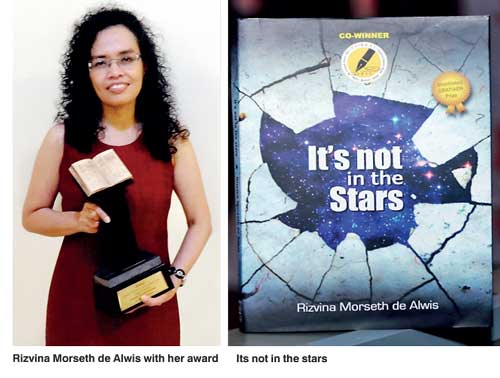Wednesday Feb 25, 2026
Wednesday Feb 25, 2026
Friday, 18 March 2016 00:00 - - {{hitsCtrl.values.hits}}
‘It’s Not in the Stars’ by Rizvina Morseth de Alwis was announced as the co-winner of the first-ever Fairway National Literary Award at the award ceremony held during the Fairway Galle Literary Festival in January.
The Fairway National Literary Award was established in conjunction with Fairway Holdings with the aim of inspiring and encouraging local writers and nurturing a culture that supports art and literature in the country. It is the only award in Sri Lanka that recognises the efforts of Sinhala, Tamil and English novelists.
As part of a long term plan to create a wider appreciation for literature and the arts across diverse segments of society, Fairway Holdings is expected to sponsor this award in union with the Fairway Galle Literary Festival for several years to come. “Sri Lanka has a rich cultural heritage that must be preserved and made sustainable. The first step towards doing this is to create a greater appreciation of local art by its people,” said Chairman Hemaka de Alwis.
Bagging the award under the English category, ‘It’s not in the Stars’ is de Alwis’ debut novel, and was also shortlisted as an unpublished manuscript for the Gratiaen Award in 2012.
Rizvina Morseth de Alwis sharing her thoughts said, “I’m ecstatic. I was happy to be shortlisted, but then to go on and win it that was a huge surprise! Writing for me has always been a solitary act of self-reflection. So, sharing my stories with others didn’t come to me so easily. But to know that others enjoy what I write and that the judges considered it worthy of this award is a boost to my confidence as a writer. It is a validation that I have a voice as a writer and has spurred me to continue on this path.”
Set against the complex background of the Sri Lankan civil conflict and the political upheavals of the ‘80s and the ‘90s, ‘It’s Not In The Stars’ is a captivating story of three friends whose lives are woven together in an inextricable manner as they transition from childhood to adulthood. The story centres around two strong women, Minu and Sam who come from very different backgrounds. As a Sri Lankan Malay, Minu finds herself caught between her family’s pressures to marry within her community and her desire to become independent and control her own destiny. Sam, who comes from a privileged Sinhala Buddhist family, is quite Minu’s opposite in nature. She is more confident and feisty but equally vulnerable to love, heartache and betrayal. Caught between Minu and Sam is Pradeep, who struggles with a renewed consciousness of his identity as a Tamil and is the thread that links them all together.
As these childhood friends begin their journeys of self-discovery, destiny plots to take away what is seemingly written in their stars. As they separate and reunite, they experience joy, innocence, heartbreak and pain that come with youth, friendship, love and loss. The novel begins with Minu’s death in a car crash in London. As Sam and Pradeep try to unravel the circumstances of her death, the narrative shuttles between the past and the present, and reveals how friendship and love are tested by a complex web of conflicting ties: family, class, race and religion.
But as Sam and Pradeep struggle to understand the truth behind Minu’s death, they find themselves on a journey of their own, discovering the truth about themselves and their relationship. De Alwis manages to convey the gamut of emotions that come with love, betrayal and loss convincingly. Her lucid style of writing and the use of evocative language bring the characters vibrantly alive amidst the deep and complex realities of living in a society that is splintered by civil strife. She describes the near tangible uncertainty of the times as well as the every-day mundane middle-class lives deftly but without sentimentality.
By rooting one of the main characters within the Sri Lankan Malay community, ‘It’s not in the stars’ provides an insight into this little known community, possibly for the first time in a work of fiction in Sri Lanka. One can also discern a distinct feminist sensibility in the narrative which reveals the author’s personal and professional interests in critiquing gender relations and social norms in contemporary society.
De Alwis works for the United Nations and is now in the midst of writing her second novel.